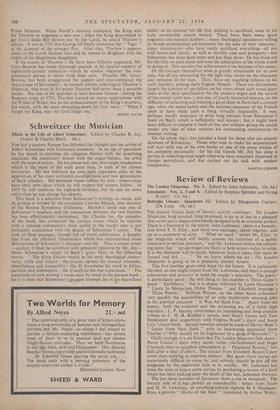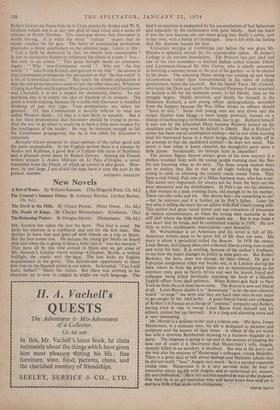Review of Reviews
Botteghe Oscure. Quaderno 12. Edited by Marguerite Caetani. (De Luca. 10s. 6d.)
THE present frantic buzz of literary activity continues : The London Magazine, long awaited, long promised, is on us at last in a pleasant blue cover and a shape conveniently designed to fit an overcoat pocket. There is a foreword by the editor, John Lehmann ; there is a benedic- tion from T. S. Eliot ; and these two messages, taken together, add up to a statement of aims. " What we need," writes Mr. Eliot,"is the magazine which will boldly assume the existence of a public interested in serious literature," and Mr. Lehmann makes the refresh- ing point that " no ideologies are likely to help writers today to write. It is the obstinate will to create, whatever form it takes, that must be fanned and fed. . . ." So we know where we are : The London Magazine is going to be a primarily literary review.
This first number gives some hope for the future. It is judiciously blended, as one might expect from Mr. Lehmann, and there is enough eclecticism and diversity to hold the reader's attention. The poetry is particularly good : the best thing in this number is Thom Gunn's poem " Earthborn," but it is closely followed by Louis Macneice's " Canto In Memoriam Dylan Thomas " and Elizabeth Jennings's " Three Poems." William Plomer, on the other hand, exhausted very quickly the possibilities of an only moderately amusing joke in his poetical anecdote " It Was All Such Fun." . Apart from the poetry, both the criticism and the reviewing are of a fairly high standard : L. P. Hartley contributes an interesting and long overdue tribute to C. H. B. Kitchin's novels, and Henry Green and Tom Hopkinson deal respectively with Virginia Woolf's diary and Joyce Cary 's latest book. Special mention should be made of Hervey Brett 's " Letter from New York " with its heartening quotation from Thurber ("Why should we be frightened by a gang of Senators ? ").
Oddly enough, it is on fiction that The London Magazine falls down : Pierre Gascar's short story seems rather old-fashioned and Hugo Charteris tries to establish atmosphere in " Displaced Person," but fails after a deal of effort. The extract from Elizabeth Bowen's new novel does nothing to-improve- matters. But good short stories are notoriously difficult to come by, and nobody should be put off the magazine by this particular hole in its middle. Mr. Lehmann has done the state of letters some service by producing a review of a kind which has been lacking since the death of the late, lamented Horizon.
The last three numbers of Encounter show a rise in standards. The literary side of it has perked up considerably : letters from Yeats and D. H. Lawrence, an autobiographical vignette by J. Maclaren- Ross, a gnostic " Hymn of the Soul " translated by Arthur Waley, Robert Graves on Juana Ines de la Cruz, poems, by Auden and W. S. Graham (which one is at any rate glad to read once) and a series of tributes to Dylan Thomas. This catalogue shows that Encounter is worth buying. It is when the word " culture " occurs that its reader reaches for his gun. The habit of enunciating portentous platitudes is firmly established on the editorial page. Listen to this : " Can a faith be destroyed by fact, no matter how catastrophic 7 Is not its distinctive feiture to withstand the shock of events ? Yes— but only to an extent." This great thought needs no comment. Again : " Why non-Communist world ' ? Why not the free world ' ? " asks Irving Kristol, and goes on to say that " the answer is that Communist propaganda has persuaded us that 'the free world' is a bit of hypocritical rhetoric." But surely the simple explanation is that the one term expresses a state of fact, the other does not. Whatever Chiang Kai-Shek and Syngman Rhee have in common with Eisenhower and Churchill, it is not a respect for democratic liberty. To say anything else is to empty the idea of freedom of its content. The point is worth making, because the trouble with Encounter is muddled thinking of just this type. Two. propositions are taken for granted : (1) that Communism is morally inferior to what are called Western Ideals ; (2) that it is less likely to succeed. But it is just these propositions that Encounter should be trying to prove. And the way to go about it would be to have a little more respect for the intelligence of the reader. He may be innocent enough to fall for Communist propaganda, but he is too adult for Encounter's editorials.
Botteghe Oscurc presents its usual mixture of the rather good and the quite unspeakable. In the English section there is a masque by Auden and Kallman, a good deal of Lallans (the curse of Scotland) and a pleasant prose piece by Robert Graves. Among the French writers present is Andre Malraux on Le Pays d'Origine, a novel translated from the Dutch, of which an extract is also given. How- ever, by and large, I am afraid the noes have it over the ayes in the



































 Previous page
Previous page